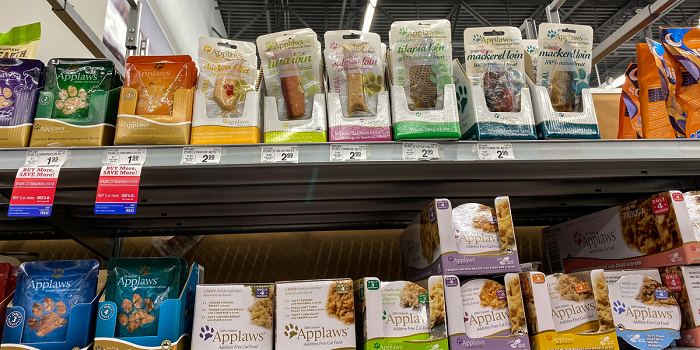
Kate Barrington / Cats.com
With so many pet foods manufactured in Thailand, we regularly receive questions from readers wanting to know whether the products made there are safe. Some of these concerns stem from the 2007 melamine scandal involving pet food made with ingredients sourced from China which has led many cat owners to be suspicious of food coming from just about anywhere in Asia. We wanted to get to the bottom of the issue and find out if cat food made in Thailand is safe.
How Is Pet Food Regulated?
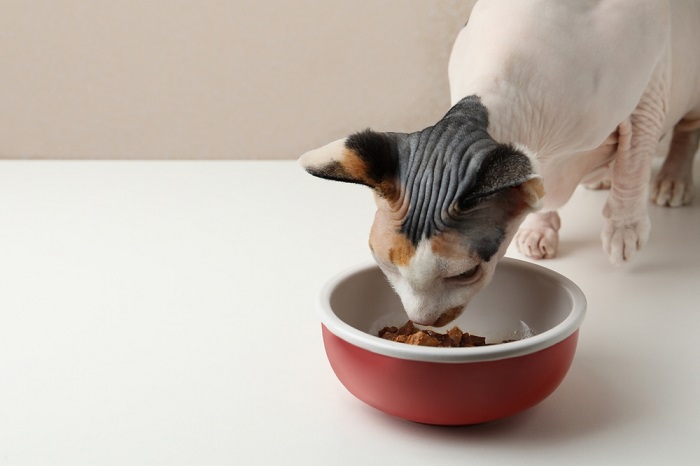
Kate Barrington / Cats.com
In the United States, the manufacture, production, and sale of pet food is not specifically regulated by the U.S. Food and Drug Administration (FDA), but many of the standards that apply to human food also apply to pet food.
Though they don’t have any regulatory authority, the Association for American Feed Control Officials (AAFCO) offers nutritional recommendations that have become the standard by which many pet food brands formulate their foods. Pet food manufacturers in the Canada typically adhere to the same AAFCO recommendations, though pet foods are technically monitored by the Canadian Food Inspection Agency (CFIA) – the Canadian equivalent of the FDA.
The U.S. serves as the prime example many pet food brands around the world aim to imitate. Many cat owners only trust products made in the USA and, after the giant melamine recall of 2007, understandably so.
In 2007, the FDA received reports of pets getting sick and dying after eating pet foods made with ingredients sourced from China. Through an in-dept investigation, the FDA discovered that several grains and vegetable proteins were tainted with melamine, a substance known to have toxic effects on cats and dogs.
As a result of the investigation, over 150 brands were recalled and pet owners in the United States developed a wariness about pet foods made in China or with ingredients sourced from China.
Is Cat Food Made In Thailand Safe?
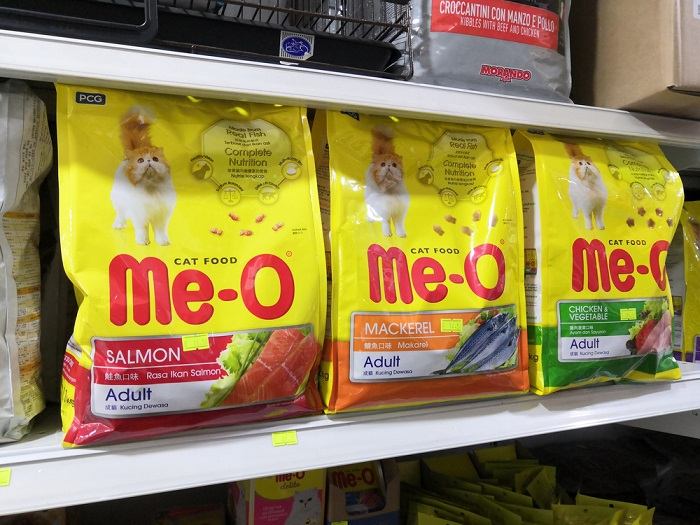
Me-O is manufactured by a Thai company called the Perfect Companion Group. Kate Barrington / Cats.com
Pet food production in Thailand is overseen by the Department of Livestock Development (DLD), similar to the United States Department of Agriculture (USDA). Thailand also has its own Food and Drug Administration which is recognized by the United States FDA.
Regulations affecting the pet food industry vary from country to country, but the DLD makes an effort to ensure the safety of products and ingredients that enter the country as well as the products made there.
The USDA regularly releases Global Agriculture Information Network (GAIN) reports in which they describe a country’s regulations, standards, and certifications for food safety. In 2013, they released a document analyzing the regulation of animal feed importation in Thailand. Here is a quote:
“The Department of Livestock Development (DLD) currently requires plant/facility audits located in exporting countries for products considered prone to severe disease contamination (i.e., BSE and Salmonella). Although the DLD has no clear criteria in determining products under this category, the list currently includes all rendered animal products (i.e., meat and bone meal and offal-derived products), egg products, and dairy products. The importer/exporter is responsible for all expenses incurred during the audit.”
In 2018, the European Union audited Thailand’s control system for poultry meat exported to Europe following a concerning 2013 audit. The audit found, “authorities responsible for the official control system on production of poultry meat and products [were] clearly designated and their structure and organization [was] adequate.” As is true in any industry, however, the audit revealed failures in compliance with and implementation of EU standards.
The lesson to take away here is that there’s no reason to suspect cat food from Thailand as a whole, but it’s worth doing the research on individual manufacturers to determine their reliability.
Why Are So Many Cat Foods Made In Thailand?
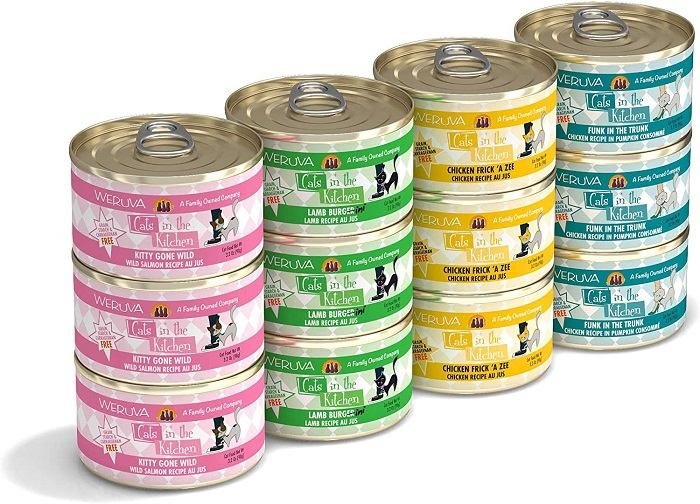
Weruva is a family-owned company and made by the Songkla Canning Company in Thailand.
The pet food industry in Thailand is growing rapidly. A 2011 paper published in the Journal of Mahanakorn Veterinary Medicine suggested that Thailand’s United States import market share is 25%. This paper was written over a decade ago, so the figure is likely to be much larger now.
But why is so much cat food being made in Thailand these days?
It’s quite simple – it’s cheaper to produce cat food in Thailand than in the United States. While the cost of running the manufacturing equipment is roughly the same, the cost of labor in Thailand is much lower.
Additionally, most of the world’s tuna is caught in Thailand. Another GAIN report published in 2018 suggests that Thailand exports over 25 million kilos of fish to the United States each year. Understandably, Thailand is one of the world’s largest hubs for the canning and processing of fish.
Here are a few of the brands that sell products made in Thailand:
Some of these brands have received A- ratings according to the Cats.com standards. They’ve been thoroughly evaluated for the quality, safety, and nutritional value of their products.
Final Thoughts
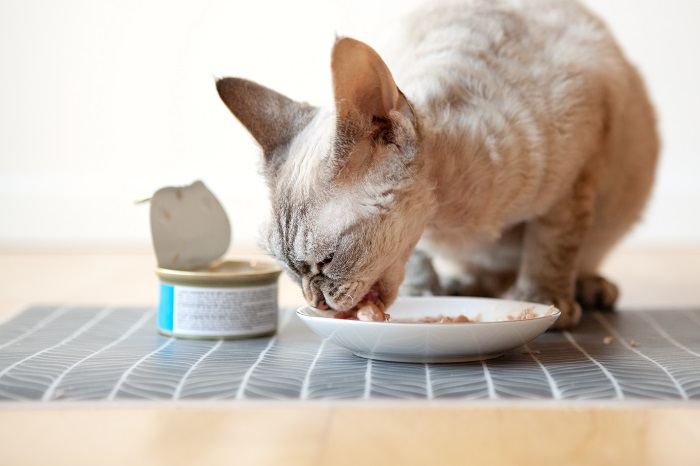
Kate Barrington / Cats.com
Regardless of where it is made, any cat food recipe should be thoroughly evaluated before you feed it to your cat. Cat foods made in Thailand, Canada, and New Zealand shouldn’t be avoided on principle, but you still need to do your job as a cat owner in making sure the food itself is nutritious, well-balanced, and species-appropriate for your cat.
While it is valuable to determine where a cat food is made, don’t forget to find out where the ingredients are sourced. Avoid cat food brands that source ingredients from China or other countries that don’t have strong food quality regulations in place.
As always, you also need to keep your cat’s nutritional needs in mind when selecting a cat food formula.
Learn more about your cat’s nutritional needs in this in-depth guide.

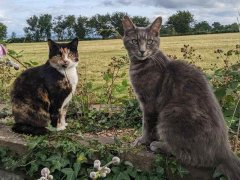
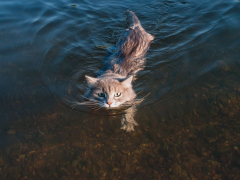
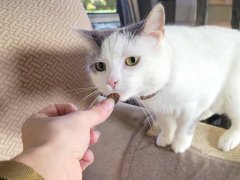
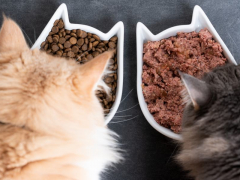
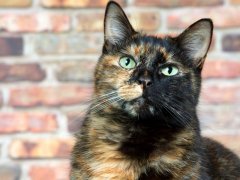
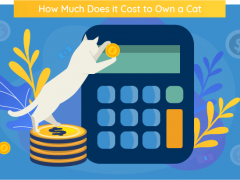
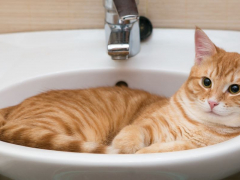
It should be obvious that so much animal food production has been moved to Thailand because that country has little to no animal welfare laws and it is impossible for Western animal welfare advocates to monitor the treatment of animals in all aspects of their imposed lifecycles. One can only imagine the horrors farmed animals go through there.
I fully agree with you the site of animals in cages in Thailand dog meat and cat market the horror on those poor animals faces with stay with me for life
Petition after petition have been sent to this government to end this horrendous barbaric meat trade I will not buy any animal food that is made in Asia country bless the poor animals just waiting in cages watching the other animals being butched knowing that its going to happen to them
The basic premise of this article is insanely racist. “While the concerns regarding pet foods made in China or with ingredients sourced from China are valid, it should be assumed that the same concerns apply to products made elsewhere in Asia.”
Hi Adam, thanks for bringing this to our attention. There is a typo in that sentence that has been corrected. It should have read “it should NOT be assumed that the same concerns apply to products made elsewhere in Asia.” The context in which this article was written had only to do with concerns related to the pet food recalls of 2007 and the potential future impact on the pet food industry going forward. My apologies for the error! We’re making revisions to clarify.
You can’t even trust bottled water in Thailand. They’re pros at getting the bottles resealed. This is what a tour guide told me. I have to look at every bottled water. No ice is safe to drink. I’ve seen some horrific parts of Bangkok with dogs on the side of the road and overpasses. They are entirely ravished, being eaten alive from the inside. It’s depressing. Humans can barely eat there without worrying about the source of the food. I wouldn’t feed anything that I care about a can of food processed in Thailand.
Thanks for sharing.
Corruption level in Thailand is pretty high. This means authorities/regulators are easily bribed and the fact that companies are attracted by this and the cheap labor is not helping the cause. Companies main interest is not high quality ingredients or services but the cheap work. It’s similar to electronics manufacturers/assembly in China, though it’s safer to buy inedibles from China than FOOD from Thailand.
I try my best to avoid pet food made in Thailand and to stick with EU, North America and Australia.
We’ve been buying BFF cat cans from Thailand. I wonder if that brand is OK or just another can of potentially unsafe junk?
You can learn more about BFF cat food in our in-depth review here.
I have been looking for different food that my cat can keep down. I came across almo nature that she finally loves and keeps down and getting information on cruelty free cat food I found out almo nature was cruelty free. And feeding my cat almo nature it angers me how chickens are horrifically tortured and killed. My cat will no longer be eating almo nature.